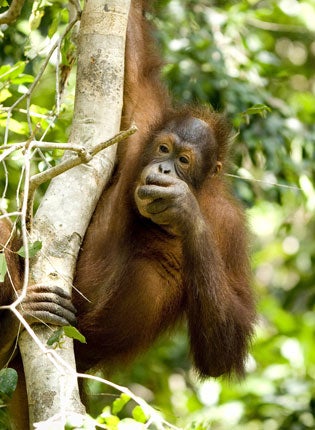Conservationists do 'deal with the devil' to save orang-utans
Agreement sought with palm-oil industry to create ape-saving forest corridors

Your support helps us to tell the story
From reproductive rights to climate change to Big Tech, The Independent is on the ground when the story is developing. Whether it's investigating the financials of Elon Musk's pro-Trump PAC or producing our latest documentary, 'The A Word', which shines a light on the American women fighting for reproductive rights, we know how important it is to parse out the facts from the messaging.
At such a critical moment in US history, we need reporters on the ground. Your donation allows us to keep sending journalists to speak to both sides of the story.
The Independent is trusted by Americans across the entire political spectrum. And unlike many other quality news outlets, we choose not to lock Americans out of our reporting and analysis with paywalls. We believe quality journalism should be available to everyone, paid for by those who can afford it.
Your support makes all the difference.Wildlife campaigners have made "a deal with the devil" in a bid to save the orang-utan from being driven into extinction. They have teamed up with the palm-oil industry, widely condemned by conservationists for causing devastation to orang-utans.
But palm-oil companies and the Sabah state government in Borneo have agreed to a project to create wildlife corridors that will link forest areas and create a network of safe havens. They signed up to the pilot scheme last month in Kota Kinabalu, Borneo, and will meet again this month in London to try to agree final details. There are hopes the project can be expanded. Dr Marc Ancrenaz, director of the Kinabatangan Orang-utan Conservation Project, agreed the alliance between conservationists and the palm oil industry was like a pact with the devil but said the green lobby had to be pragmatic in its hopes of saving the red ape.
"The oil-palm industry is going to stay," he said. "There's no point in fighting development. We need to look for a solution together to save the orang-utan. By recreating 100m-wide corridors of forest along major rivers we will provide contiguous corridors of natural habitat to link isolated orang-utan populations. The oil-palm industry has to be part of our conservation efforts if we want to succeed, since the major orang-utan populations in Sabah are fragmented by oil-palm estates."
The meeting in London has been organised by the World Land Trust (WLT), which is anxious to keep all sides talking. Mary Tibbet, of the WLT, said: "It's important to get everyone to the table. The palm-oil industry has been vilified but there could be a mechanism in which they are engaged in the conservation of orang-utans.."
Orang-utans live only in Borneo and Sumatra but have been pushed back into ever-smaller areas of their rainforest habitat largely because of intensive logging and agriculture. In the past century, orang-utan numbers in Borneo and Sumatra have slumped by more than 75 per cent, and in Sabah they have crashed up to 90 per cent in 200 years. But Sabah remains a stronghold for the animal, with more than 11,000 orang-utans living there, a fifth of the total estimated wild population.
The palm-oil industry has expanded rapidly over 20 years, encroaching heavily on the forests where orang-utans live, in response to increasing demand from western countries for palm-oil in cooking and in biofuels. Malaysia is the world's biggest producer of palm oil, the country's third-biggest export, worth £11.5bn last year.
Without the corridors, the animals, which dislike travelling either on the ground or through crop plantations, are trapped in small areas of forest. These fragments support only a handful of the apes and in the long term they would die out because the gene pool is too small to be biologically viable.
The World Bank has stopped lending money to the palm-oil industry amid concerns about the impacts of plantation expansion on local people and the effects of deforestation on orang-utans and other wildlife. Companies such as Lush cosmetics and Cadbury New Zealand have stopped using palm-oil because of environmental concerns.
Join our commenting forum
Join thought-provoking conversations, follow other Independent readers and see their replies
Comments